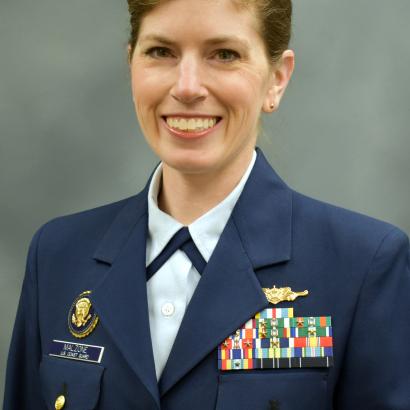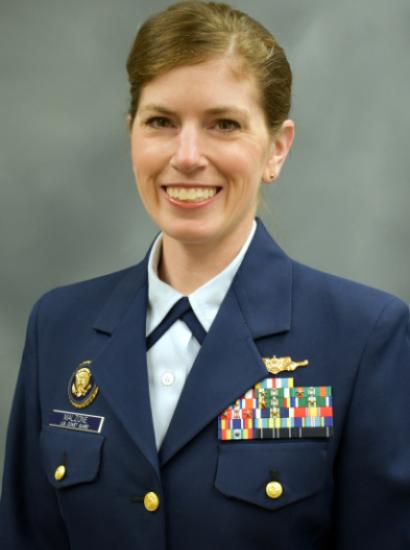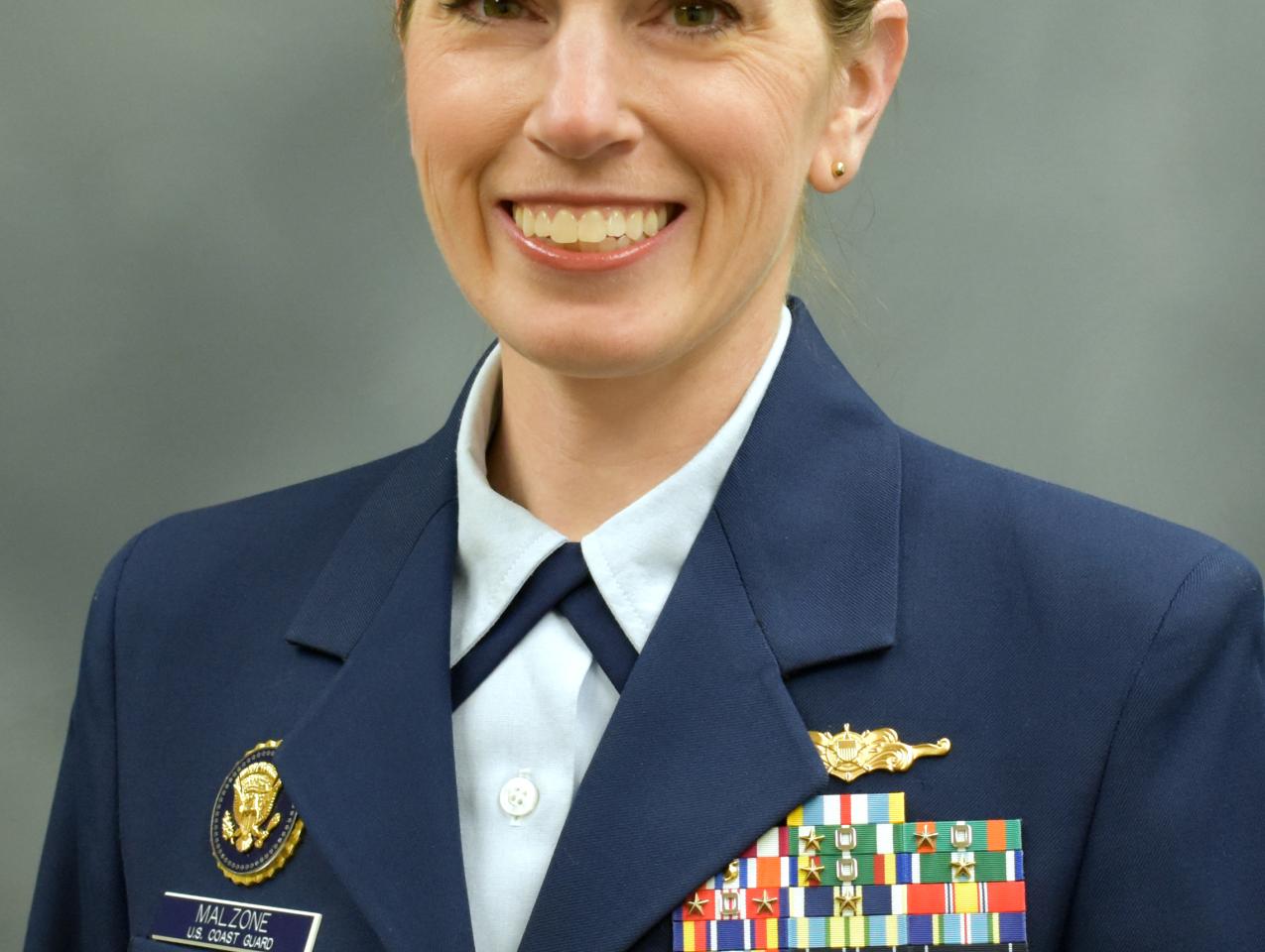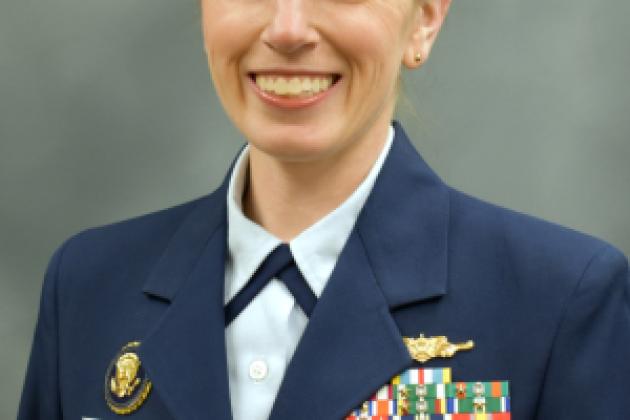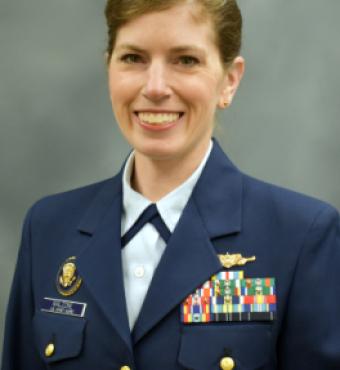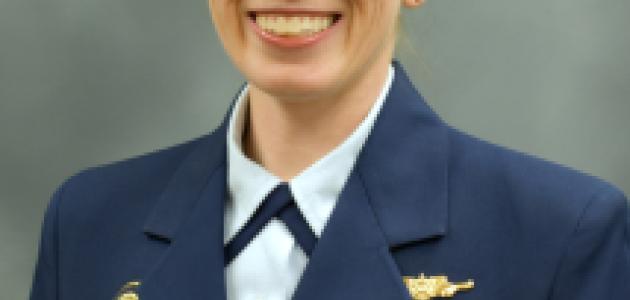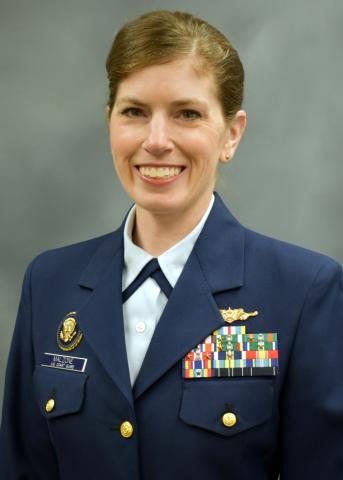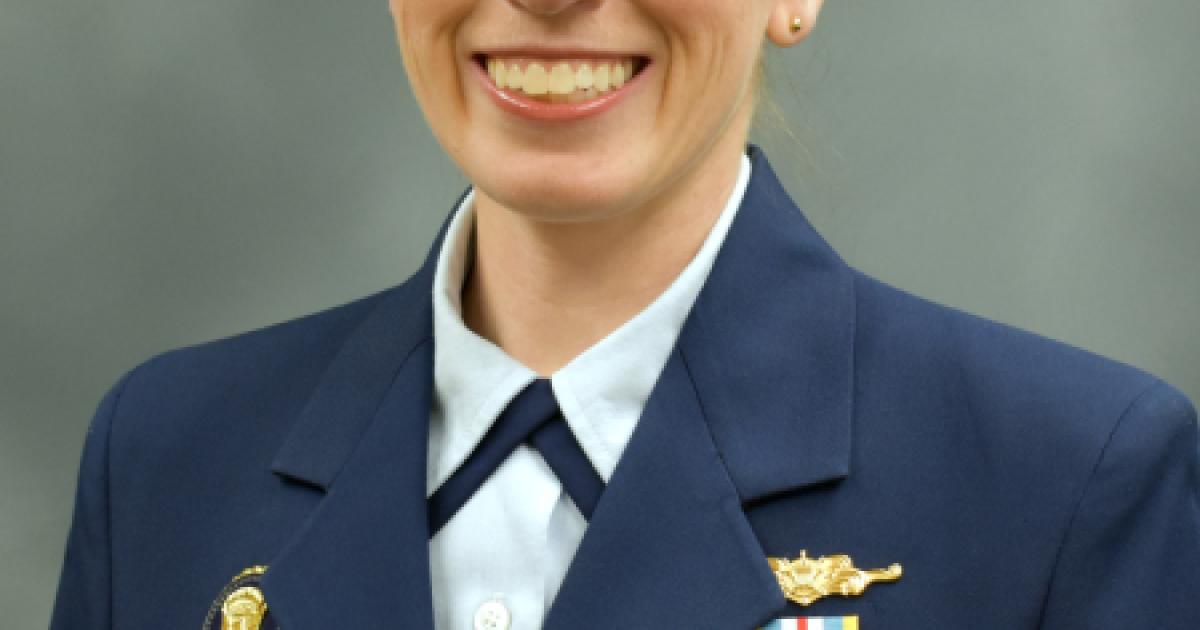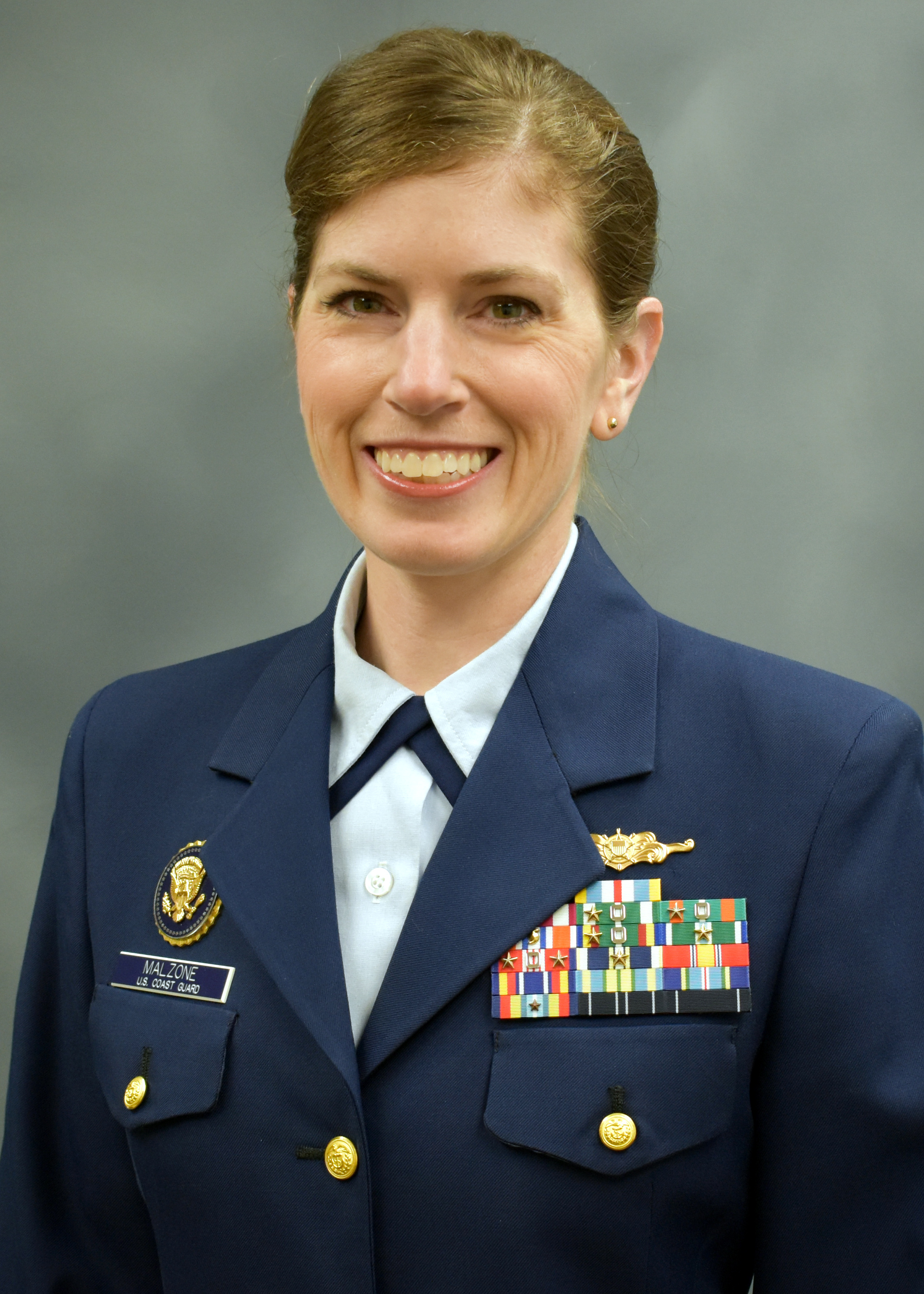
by Jonathan Movroydis
Commander Jillian Malzone, representing the US Coast Guard, is a National Security Affairs Fellow for the academic year 2019–20 at the Hoover Institution.
In this interview, Malzone discusses her development as a US Coast Guard officer; her assignment as President Obama’s Coast Guard aide; the Coast Guard’s work to prevent Russia’s expansion in the Arctic region; and challenges to the service in recruitment and retainment of forces.
Why did you join the US Coast Guard?
Malzone: I would like to say my father talked me into it. Today he laughs, because he doesn’t remember. When I was in high school, the military wasn’t on my radar. My dad was briefly in the Merchant Marines, but otherwise nobody in my immediate family had served, and my impression of the military was based on the stereotypes you see on TV and in the movies. When I was a sophomore in high school, the US Coast Guard Academy [CGA] started sending me literature, especially about their sailing team. Whenever I received new mail from them, I threw it in the trash. My father would then come right behind me and fish it out. It started to accumulate into a stack in his desk drawer.
My junior year, he started his campaign in full earnest. He told me, “Jillian, you should apply to the US Coast Guard Academy.” I had my heart set on a more traditional college—and wasn’t interested at all. But, as fathers can do, he eventually wore me down bit by bit. We struck a deal that he would pay for my other applications if I would just fill out an application. I figured I wasn’t planning on attending anyway, so there was no harm in doing so.
To my surprise, I was accepted. My father was ecstatic! I still was insistent that a military school was not in my future (how naïve I was). Yet my dad kept up the subtle pressure, making sure to drive by the academy on our college tours, and always work it into conversation. One day, he came home after attending a meeting for parents of prospective academy cadets wearing a “Class of 2000” ballcap. It was then that I caved, and we struck a deal (mind you, my dad denies all of this!). I had also been accepted at one of the colleges that I had originally wanted to attend, and he agreed to send the deposit in for that school if I agreed to attend the academy’s summer program for incoming freshmen (“swab summer”)—leaving the option open for me to depart CGA at the end of the summer if it wasn’t the right fit, and still have time to begin my freshmen year at my choice school. Plus, that year the culmination of swab summer included one week sailing aboard the Eagle (the CGA’s tall masted sailing ship) in the English Channel. I couldn’t resist the lure of adventure. And so, after two years of soft pressure from my parents, I was CGA bound.
My father knew what he was doing. It turns out that I stayed, and I worked towards a bachelor’s degree in mechanical engineering. The academy was a doorway to a lot of great opportunities, more than just guaranteed employment after graduation. The day-to-day missions of the Coast Guard were personal and exciting, but more than anything I loved the comradery that came from being a part of a team of really great people, both at the academy and throughout my career.
The focus of your career has been response operations. What does this work entail?
Malzone: There are two different response tracks—afloat and ashore—and I have worked in both. With six years of sea time, I’ve served on board cutters that perform missions such as search and rescue, counternarcotics, fishing compliance with federal regulations, migrant interdiction, and other related issues at sea. There is also “response ashore,” which consists of several subspecialties regarding response operations, such as search-and-rescue coordination or marine environmental response. My background on the response ashore side lies mainly in the emergency management and operations coordination realm.
The Coast Guard has beautiful duty locations, and I’ve had the good fortune to be stationed in places such as Honolulu, Charleston, Newport, and Seattle. While some may assume that the Coast Guard’s area of responsibility is just focused on the waters within a few miles of the US, that’s actually false; my time in service has brought me to patrol waters in places such as the Caribbean and the mid-Pacific. The Coast Guard has a much more global reach than most are aware.
How did you get selected as the president’s Coast Guard aide?
Malzone: Pure luck! I found out about the job and thought it sounded fascinating. I figured that I would never be selected, because there are so many people that apply. The opportunity to travel the world appealed to me, as well as working in a multiservice team and coordinating across different agencies. There were several rounds of interviews within the Coast Guard and the White House, with the director and deputy director of the White House military office having final approval. I truly enjoyed my tour at the White House. The people were incredible, and the tempo was fast-paced and engaging. President Obama was always gracious. When we traveled, he was very busy dealing with his work, but he would often engage me and other staff in conversation and humor.
The most memorable experiences of the entire tour were the Medal of Honor ceremonies. My fellow military aides and I were involved with the official ceremonies, where we would read the award citations and pass the medals to the president for the physical presentation. It was incredibly moving to hear of the gallantry of these members, and to often be able to meet the heroes in person. Just awe inspiring.
I was honored to have been promoted to commander in the Oval Office. President Obama pinned the new insignia on my uniform. My son, then two and half years old, was patient throughout the entire ceremony. He did very well. Afterwards, the White House photographer captured a picture of him giving the president a high-five!
What did your work entail at the Coast Guard’s Office of Strategic Workforce Planning?
Malzone: After my first two tours as an officer, the Coast Guard sent me to graduate school at the College of William & Mary, where I received my master’s in computational operations research, a multidisciplinary study in mathematics and computer science. The Coast Guard wanted to apply the knowledge I gained during graduate school to help analyze and project what the service would look like in five years from a personnel standpoint. This meant projecting trends such as how many additional recruits the Coast Guard might need, where the gaps would be in terms of career specialties, and what impacts outside factors such as the economy or the anticipated job market might have on retention across the field. The work consisted of a lot of number crunching and data analysis with the objective of developing a plan to keep the workforce strong and sustained.
What are the biggest challenges of the Coast Guard?
Malzone: The Coast Guard is unique in the sense that we fall under the Department of Homeland Security instead of the Department of Defense, which can lead to different interagency dynamics than what the other services experience. This can be tough from a budgetary perspective, because our mission requirements are only getting broader, but it also allows us some mission flexibility that the other services may not have.
In terms of strategic challenges, the Coast Guard’s operational demands are increasingly global in nature, because we are able to step into roles that are outside the bailiwick of the other services. We’re seeing an expansion of mission requirements in the Indo-Pacific region, mostly as a check on China’s aggressive political and economic activities in the area. We’re also putting a lot of focus on the Arctic as a result of the ice caps melting and the activity of Russia’s icebreaker fleet, which enables the exploitation of natural resources and paves the way for new shipping lanes and naval presence. In contrast to Russia’s large icebreaker fleet, the United States has very few icebreakers, and we are unable to maintain a constant presence in the Arctic. It will also be several years before our icebreaker fleet starts to grow again. This is a significant challenge as Russia and China are expanding their political and economic presence in the region.
What is your research focus at the Hoover Institution?
Malzone: During my time at Hoover, I have been focused on how to best optimize human resources management to recruit and retain Coast Guard personnel. In the US today, only about 23 percent of young people, ages eighteen to twenty-four, are eligible to join the military based on current standards.
This is a low number. Of those 23 percent who are eligible, the proportion of young people who actually desire to join the military is much lower. And for those that do join, most have at least one member in their family who has previously served (you could call it a family business, in a way). Further, the military is in direct competition with corporate America to recruit their workforce. How do we increase the appeal of national service? In what ways can the military modernize to meet the demands of these young people? Are there any tangible practices that can be brought over from the business sector and employed effectively by the military? What can we do to build incentives that will retain them?
Part of my research has included digging into the command culture and human resource practices at firms located within Silicon Valley. These firms are always at the cutting edge of technological innovation and are able to easily recruit top talent. While the military can’t replicate the private-sector workplace, there are potentially adjustments we can make to better recruit, retain, and increase the productivity of our forces.
Is there a colleague at Hoover who made you think differently about your work in the Coast Guard or subject matter you are studying?
Malzone: I am inspired by the diversity of thought at Hoover on a daily basis. I have learned so much in this year that has broadened my knowledge—both in topics that may impact the Coast Guard and national security, such as the great-power competition, but also in areas that impact our nation and world as a whole, such as education policies. The Hoover fellows are a diverse and inspiring group, and all have been so generous in sharing their time and thoughts with us this year. It has been incredible to learn from their personal experiences. Further, in the past few months, it has been a valuable study to see brilliant minds pivot in their research to address the COVID-19 pandemic.
Outside of Hoover, it’s been amazing to be a part of the larger Stanford community. During our year as fellows, we are each paired with several mentees—Stanford University undergraduates who have achieved academic excellence and are interested in the pursuit of more direct knowledge of public policy or national security. I am in awe of the knowledge base, drive, and future potential of the mentees with whom I have had the honor to work. They have enriched my year at Hoover, and I have fully enjoyed engaging in discussions and gaining different perspectives from these young people who come from diverse backgrounds. I can only hope that they have learned as much from me as I have from them.
What does leadership mean to you?
Malzone: Leadership means setting the example for how you want people to act and treat others. Whether it’s in personal life or out in public, these qualities include transparency and looking out for others.
What do you do for fun?
Malzone: We have two little boys, so we spend a lot of time at the park, riding bikes, and exploring Stanford and the Bay Area. We have loved attending Stanford sporting events, especially football games, water polo matches, and gymnastics competitions. It’s been a treat to live in a college town, with so many opportunities to experience!







